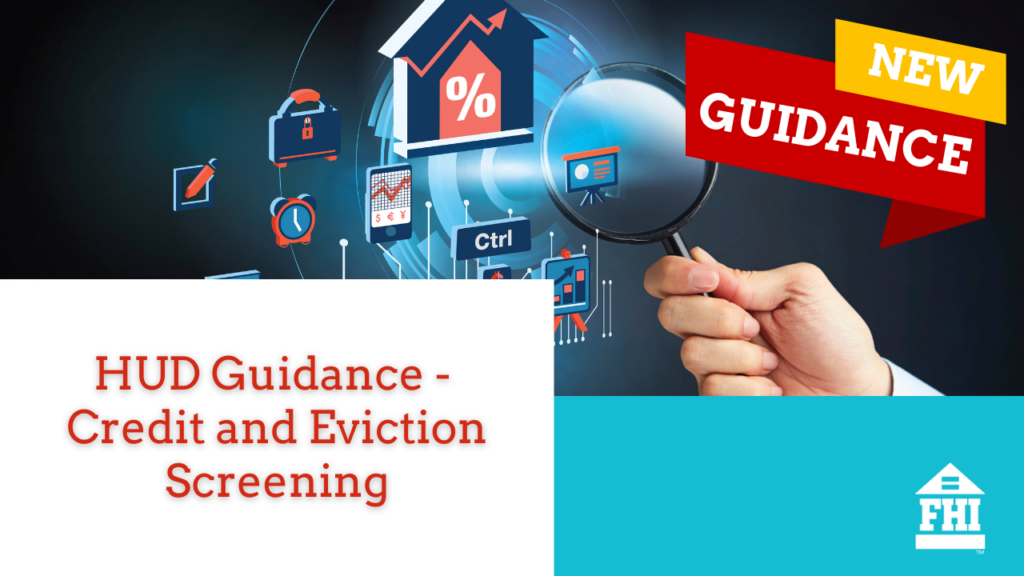On May 2nd, 2024, HUD announced new notices in a press release about not only AI but credit and eviction screening processes. In past episodes, we have discussed a brief overview of these notices as well as a deeper look into the criminal history screening update.
In this special episode, we share critical insights with the property management community, focusing on the other portion of the mandate, detailing criminal history, credit, and eviction screening, and helping housing providers navigate complex fair housing requirements.

Table of Contents
Key Points of the New Guidance
This new guidance is not to be confused with HUD’s proposed regulations concerning criminal history screening. While both address important aspects of applicant screening, they differ in scope. The proposed regulations apply only to housing authorities and HUD-funded properties, whereas the new guidance applies to nearly all rental properties covered under the Fair Housing Act.
This guidance expands its focus to include credit and eviction screening in addition to criminal history screening, highlighting the potential for disparate impacts on various protected groups under the Fair Housing Act.
Credit and Eviction Screening: HUD’s Justification
HUD’s analysis is based on statistical data indicating that certain groups—such as Black and Brown individuals, people with disabilities, and survivors of domestic violence—are more likely to have poor credit or eviction records. HUD also notes that Black and Hispanic applicants, women, families with children, and people with disabilities experience disproportionately higher rates of eviction compared to other demographic groups.
These findings are prompting HUD to call for a reassessment of how screening practices—particularly those related to credit and eviction—are applied. Housing providers are encouraged to consider the broader context of an applicant’s situation, especially when using screening tools.
Making Exceptions Without Risking Fair Housing Violations
One of the most critical questions for property managers is whether making exceptions for applicants within protected categories might expose them to fair housing violations. HUD does not require blanket exceptions but stresses that housing providers should evaluate relevant circumstances, such as when an applicant’s rent is covered by a third party, like a Housing Choice Voucher (Section 8). In cases like these, HUD argues that poor credit or failure to meet minimum income requirements should not be automatic disqualifiers, as they are not directly relevant to the applicant’s ability to pay rent.
Additionally, HUD emphasizes the importance of considering any mitigating circumstances, such as a past medical emergency that might have impacted an applicant’s financial standing but is no longer relevant to their current situation.
While HUD encourages property managers to consider these factors, it is essential that any exceptions made are carefully documented to avoid any appearance of favoritism or inconsistency in the screening process. Detailed records will help protect housing providers from potential fair housing violations, ensuring decisions are based on objective, documented criteria.
The Role of Screening Software
A significant portion of the guidance addresses the use of screening software, which many housing providers rely on for making quick and objective decisions about applicants. HUD has expressed concern that these tools often produce inaccurate or incomplete records, potentially leading to erroneous denials.
To mitigate this risk, HUD recommends that housing providers have processes in place for applicants to dispute inaccurate information, submit mitigating evidence, and provide additional context that might affect their screening outcomes. HUD also cautions against relying solely on credit scores and urges housing providers to focus on factors directly related to tenancy.
Key Takeaways for Property Managers
Several critical points from the guidance stand out for housing providers:
1. Liability Risks: Housing providers cannot shield themselves from liability by using third-party screening tools. Even when using automated systems, they remain responsible for ensuring that screening processes are fair and non-discriminatory.
2. Relevant Criteria: Screening criteria should be specific and limited to a defined period. For example, if your software only considers felony convictions from the past five years, your application should not ask about all felony convictions. Similarly, eviction records should only be considered if they result in a final judgment against the tenant.
3. Transparency: HUD stresses the importance of transparency in the screening process. Applicants should have easy access to your tenancy criteria, information on how to submit mitigating evidence or contest inaccurate records, and how to request reasonable accommodations. Ideally, this information should be available on your website and in writing.
A Fair Housing Takeaway
This latest guidance from HUD represents an important update for property managers. It carries significant implications for how screening processes should be conducted. It encourages a more thoughtful and individualized approach, especially when dealing with applicants from protected groups.
As always, housing providers are urged to stay informed, remain transparent, and document their processes thoroughly to minimize risks and maintain compliance with fair housing laws. By doing so, they can ensure that their applicant screening practices are both fair and legally sound, helping to create inclusive communities that comply with the Fair Housing Act.
For more insights, tune in to future episodes of Fair Housing Insiders, and be sure to sign up for our newsletter for the latest updates, blogs, and training opportunities. Happy training!
You may also like:
